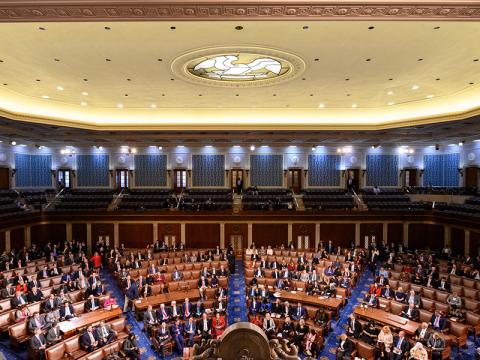Congress is About To Think About Doing Good Things Today
 |
As House members returned to Washington this week, Speaker Mike Johnson, R-La., was already struggling to rally his caucus around a bill to extend a 9/11-era surveillance program. The effort to reauthorize the Foreign Intelligence Surveillance Act’s Section 702had already split the House GOP for months. but a compromise of sorts was finally about to hit the floor Wednesday, just days before the program is set to expire.
And then former President Donald Trump weighed in.
“KILL FISA, IT WAS ILLEGALLY USED AGAINST ME AND MANY OTHERS. THEY SPIED ON MY CAMPAIGN!!!” he wrote on Truth Social, resurrecting one of his long-standing false claims about the 2016 election. And the bill being debated didn’t concern all of FISA, just Section 702. But Trump’s post was enough to bolster a revolt among conservative Republicans, 19 of whom voted with Democrats to block the reauthorization bill from coming up for debate. For once, though, the GOP’s disarray and obedience to Trump fortuitously may be put to good use. While Trump’s “Spygate” narrative remains false, it may be harnessed to improve a broken part of America’s intelligence-gathering system.
For once, though, the GOP’s disarray and obedience to Trump fortuitously may be put to good use.
Section 702 was first tacked on to FISA in 2008 to legalize a once-secret program intelligence agencies use to stockpile communications data from foreigners living abroad without warrants. It quickly became clear that key safeguards, which were meant to protect Americans’ data caught up in the sweep from being reviewed without warrants, were failing. A court order released last year from the Foreign Intelligence Surveillance Court, which oversees the use of FISA’s spying tools, showed that the FBI had repeatedly violated its own standards for searching Section 702 data for information about Americans.
We should be careful not give Trump too much credit, though. Again, his claims about FISA’s being used to illegally spy on his campaign are false. And the former president has forgotten he already flip-flopped on this issue. Trump’s post Wednesday also echoes a tweet from him in 2018, when Section 702 was last up for reauthorization. He wound up reversing course when members of his Cabinet and then-Speaker Paul Ryan, R-Wis., rushed to make sure that he supported the bill that his administration had publicly backed.
Moreover, the early stages of the Russia investigation — what Trump misleadingly characterizes as “spying” — didn’t depend on the Section 702 collection system. Instead, the FBI’s counterintelligence team went to the FISC for a warrant to surveil Carter Page, a campaign aide, to see whether he was communicating with Russian assets. That has been spun into the full “Spygate” narrative that Trump has been peddling since 2017 as a way to undercut the investigation entirely. While the Justice Department’s inspector general did find faults in the approval for the FISA warrant against Page, the IG also concluded that the investigation was properly opened. Trump-appointed special counsel John Durham was also unable to find any evidence of wrongdoing in the FBI’s opening its investigation.
Despite all that, this is a case in which Trump’s delusions are potentially being harnessed for a net positive result. Section 702 itself feels like a necessary evil as far as preventing terror attacks and other clear national security threats originating abroad, but the ability to turn that system’s powers back on Americans, in violation of the Fourth Amendment, is one that demands the strictest of firewalls. Civil liberties groups have called for allowing it to sunset entirely absent major reforms, letting the intelligence community focus on other methods of collection, instead.
Despite all that, this is a case in which Trump’s delusions are potentially being harnessed for a net positive result.
While Trump’s post rallied conservative opponents to the bill, it’s striking that the rule that was voted down Wednesday managed to get out of committee only because of a proposed bipartisan amendment to the reauthorization bill. The list of co-sponsors is one that you’d never expect to see grouped together, ranging from committed progressives to MAGA die-hards: Reps. Andy Biggs, R-Ariz.; Pramila Jayapal, D-Wash.; Jerry Nadler, D-N.Y.; Warren Davidson, R-Ohio; Zoe Lofgren, D-Calif.; and Jim Jordan, R-Ohio. Their proposed change would block “warrantless searches of U.S. person communications in the FISA 702 database, with exceptions for imminent threats to life or bodily harm, consent searches, or known cybersecurity threat signatures.”
Comments